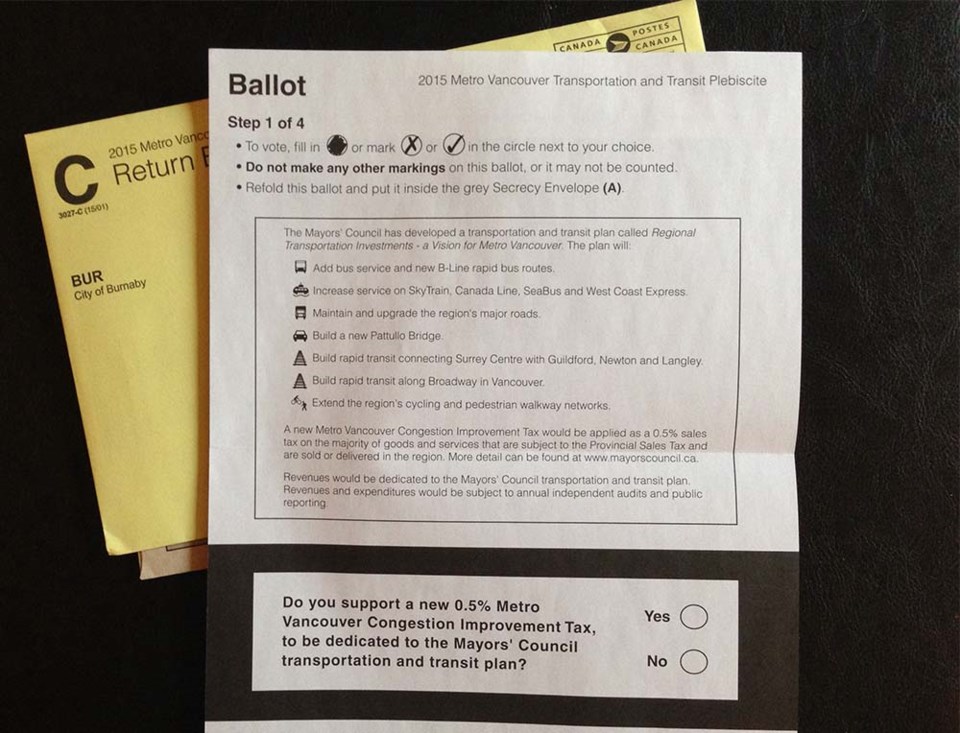Burnaby voters were amongst those in the region to strongly oppose a proposed transportation tax to fund projects throughout Metro Vancouver.
Nearly 65 per cent of Burnaby voters voted no in the transit plebiscite, which wrapped up at the end of May.
Elections B.C. reported that 69,468 registered voters in Burnaby sent in their ballots, with 64.94 per cent voting no and 35.06 per cent voting yes.
In total, 61.68 per cent of registered voters in Metro Vancouver rejected the plan, with 48.64 per cent of registered voters in the region sending in their ballots.
While Burnaby didn’t have any major projects tied to the plebiscite results, Coun. Dan Johnston said the city is waiting to see what’s proposed, in terms of funding transit.
“We didn’t have a lot on the table as far as projects are concerned,” Johnston, who heads the city’s transportation committee, told the NOW.
There were some minor projects for the city, particularly north to south transportation improvements, in the plan, he added.
“I think from Burnaby’s perspective, we’re going to continue to work towards making sure that the projects that Burnaby needs are high on TransLink’s, or its successor group’s, agenda,” he said, adding he hopes for better funding proposals in the future – ones that don’t include raising property taxes.
“I think the region needs to smell the coffee a little bit and get down and look at some serious proposals for funding transit in Greater Vancouver,” he said.
The transportation committee will be meeting to come up with long-term objectives for the city, most likely this fall, he added.
“I think we just have to be diligent that Burnaby gets its fair share, as a municipality that’s located in the centre of the (region), and that transit is a priority because Burnaby residents shouldn’t have to put up with traffic coming in from the Fraser Valley,” Johnston said.
The Burnaby Board of Trade also weighed in on the results, asking the province and TransLink to start working on a new solution.
“A long-term, regional transit plan is vital to the future economic health and continued livability of our region. The provincial government, the Mayors’ Council and TransLink need to understand what voters were saying with this plebiscite result and then get back to the table and determine a plan for where we go from here,” Paul Holden, board president and CEO, said in a press release. “While we need to listen to and address the concerns voters raised during this plebiscite, we feel that in many ways the vote was more an expression of dissatisfaction and a rejection of this specific funding model than a vote against improved transit and transportation.”
The plebiscite results were about voters rejecting a tax increase, not about the public perception of TransLink, according to Doug Allen, TransLink’s interim CEO.
“I know some of you will say this is about TransLink,” he said at a press conference on Thursday. “No, it is not.”
Allen went on to say the system is recognized by experts for its efficiency. The issue came down to the increased cost to voters, he said.
TransLink will review the system and work with the provincial government and the Mayors’ Council on a funding solution, Allen said.
The plebiscite question asked whether voters would accept a 0.5 per cent increase to the PST to help fund 10 years’ worth of transit projects put forth by the Mayors’ Council. The 10-year transit plan would have cost $7.5 billion, and additional work would bring the final total to $7.7 billion over 15 years.
The plan also included building a new Broadway subway line, adding more B-line bus routes and replacing the Pattullo Bridge.



